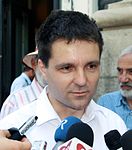
Back Parlamentswahl in Rumänien 2016 German Ρουμανικές βουλευτικές εκλογές (2016) Greek Elecciones legislativas de Rumania de 2016 Spanish Élections parlementaires roumaines de 2016 French 2016-os romániai parlamenti választások Hungarian Elezioni parlamentari in Romania del 2016 Italian Wybory parlamentarne w Rumunii w 2016 roku Polish Alegeri parlamentare în România, 2016 Romanian Парламентские выборы в Румынии (2016) Russian 2016年羅馬尼亞國會選舉 Chinese
| |||||||||||||||||||||||||||||||||||||||||||||||||||||||||||||||||||||||||||||||||||||||||||||||||||||||||||||||||||||||
All 136 seats in the Senate All 329 seats in the Chamber of Deputies 69 S and 165 D seats needed for a majority | |||||||||||||||||||||||||||||||||||||||||||||||||||||||||||||||||||||||||||||||||||||||||||||||||||||||||||||||||||||||
|---|---|---|---|---|---|---|---|---|---|---|---|---|---|---|---|---|---|---|---|---|---|---|---|---|---|---|---|---|---|---|---|---|---|---|---|---|---|---|---|---|---|---|---|---|---|---|---|---|---|---|---|---|---|---|---|---|---|---|---|---|---|---|---|---|---|---|---|---|---|---|---|---|---|---|---|---|---|---|---|---|---|---|---|---|---|---|---|---|---|---|---|---|---|---|---|---|---|---|---|---|---|---|---|---|---|---|---|---|---|---|---|---|---|---|---|---|---|---|---|
| Registered | 18,403,044 | ||||||||||||||||||||||||||||||||||||||||||||||||||||||||||||||||||||||||||||||||||||||||||||||||||||||||||||||||||||||
| Turnout | 39.46% ( | ||||||||||||||||||||||||||||||||||||||||||||||||||||||||||||||||||||||||||||||||||||||||||||||||||||||||||||||||||||||
| |||||||||||||||||||||||||||||||||||||||||||||||||||||||||||||||||||||||||||||||||||||||||||||||||||||||||||||||||||||||
 The results for the Senate and for the Chamber of Deputies | |||||||||||||||||||||||||||||||||||||||||||||||||||||||||||||||||||||||||||||||||||||||||||||||||||||||||||||||||||||||
| |||||||||||||||||||||||||||||||||||||||||||||||||||||||||||||||||||||||||||||||||||||||||||||||||||||||||||||||||||||||
 |
|---|
Parliamentary elections were held in Romania on 11 December 2016.[2] They were the first held under a new electoral system adopted in 2015, which saw a return to the proportional electoral system last used in the 2004 elections. The new electoral legislation provides a norm of representation for deputies of 73,000 inhabitants and 168,000 inhabitants for senators, which decreased the number of MPs.[3]
A total of 466 parliamentary seats (308 deputies, 18 minority deputies, and 134 senators) were contested, compared with the 588 parliamentarians elected in 2012. The diaspora was represented by four deputies and two senators, elected by postal vote.[4] The elections saw a turnout of 39.5%, lower than in 2012 but slightly higher than in the 2008 elections.
Cite error: There are <ref group=lower-alpha> tags or {{efn}} templates on this page, but the references will not show without a {{reflist|group=lower-alpha}} template or {{notelist}} template (see the help page).
- ^ Legea privind alegerea Senatului şi a Camerei Deputaţilor, precum şi pentru organizarea şi funcţionarea Autorităţii Electorale Permanente, cu modificările şi completările ulterioare [The Law on the election of the Senate and the Chamber of Deputies, as well as on the organization and operation of the Permanent Electoral Authority, with subsequent amendments and additions - Updated text] (PDF) (208, 94.12) (in Romanian). 20 July 2015.
- ^ "Alegeri parlamentare 2016. Guvernul a decis ca pe 11 decembrie sa votam senatorii si deputatii". Știrile ProTV. 31 August 2016.
- ^ Pană, Ştefan (5 January 2016). "ANALIZĂ: 2016, anul alegerilor locale şi parlamentare. Noile reguli electorale". Mediafax.
- ^ "Legea votului prin corespondenţă, promulgată de preşedinte". Gândul. 19 November 2015. Archived from the original on 14 September 2016. Retrieved 10 January 2016.
© MMXXIII Rich X Search. We shall prevail. All rights reserved. Rich X Search






